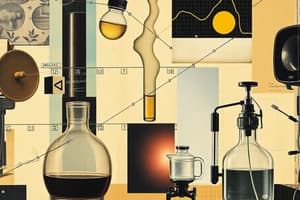Podcast
Questions and Answers
What is the main objective of a chemical analysis, whether performed using classical or instrumental methods?
What is the main objective of a chemical analysis, whether performed using classical or instrumental methods?
- To provide information to solve a problem or make a decision (correct)
- To confuse researchers with complex analytical techniques
- To complicate the situation by withholding results
- To randomly measure samples without any purpose
Which step in chemical analysis requires a solid understanding of analytical techniques, problem-solving skills, experience, and intuition?
Which step in chemical analysis requires a solid understanding of analytical techniques, problem-solving skills, experience, and intuition?
- Obtain and Store the Sample
- Define the Problem (correct)
- Sample Preparation
- Perform Measurements
What is the purpose of developing a model for the analysis in the steps of chemical analysis?
What is the purpose of developing a model for the analysis in the steps of chemical analysis?
- To provide a specific statement of the problem and information about the sample and analyte (correct)
- To skip over important details
- To delay the analysis process
- To confuse analysts with unnecessary complexity
Which step in the chemical analysis process involves measuring replicate samples to establish the precision of the method?
Which step in the chemical analysis process involves measuring replicate samples to establish the precision of the method?
What is essential for reliable and convincing analytical results in chemical analysis?
What is essential for reliable and convincing analytical results in chemical analysis?
In every analytical result, what must be presented to indicate the precision of an analytical method?
In every analytical result, what must be presented to indicate the precision of an analytical method?
What is the main purpose of developing analytical methods in science?
What is the main purpose of developing analytical methods in science?
Which of the following is NOT a classical method of analysis?
Which of the following is NOT a classical method of analysis?
What is the main difference between procedure and protocol in instrumental methods of analysis?
What is the main difference between procedure and protocol in instrumental methods of analysis?
In gravimetric measurements, what is determined?
In gravimetric measurements, what is determined?
What does an analytical instrument primarily provide information on?
What does an analytical instrument primarily provide information on?
Which term refers to a measuring device for determining the present value of a quantity under observation?
Which term refers to a measuring device for determining the present value of a quantity under observation?
What is the main function of a measurement system in engineering?
What is the main function of a measurement system in engineering?
Which of the following is not a method for performing dimensional measurements?
Which of the following is not a method for performing dimensional measurements?
Which of the following is the basic principle for correct measurements in manufacturing?
Which of the following is the basic principle for correct measurements in manufacturing?
What is the preferred way to present the results of an analytical method?
What is the preferred way to present the results of an analytical method?
Which of the following is not a reference used in the history of length units?
Which of the following is not a reference used in the history of length units?
What is the key factor in engineering for correct measurements?
What is the key factor in engineering for correct measurements?
Flashcards are hidden until you start studying
Study Notes
Chemical Analysis Objectives
- The main objective of chemical analysis is to determine the identity, quantity, or function of a specific species in a sample.
Steps in Chemical Analysis
- Developing a model for the analysis is necessary to establish a theoretical framework for the experiment.
- Measuring replicate samples is essential to establish the precision of the method.
- The step that requires a solid understanding of analytical techniques, problem-solving skills, experience, and intuition is the selection and implementation of the analytical method.
Reliable Analytical Results
- Essential for reliable and convincing analytical results is the ability to accurately quantify the uncertainty of the measurement.
- In every analytical result, the precision of an analytical method must be presented to indicate the reliability of the data.
Analytical Methods
- The main purpose of developing analytical methods in science is to provide a means of measuring the chemical composition of a sample.
Classical vs Instrumental Methods
- Titrimetry is a classical method of analysis.
- The main difference between procedure and protocol in instrumental methods of analysis is that a procedure is a general guide, while a protocol is a detailed, specific set of instructions.
Measurements and Instruments
- In gravimetric measurements, the mass of a substance is determined.
- An analytical instrument primarily provides information on the physical or chemical properties of a substance.
- A sensor is a measuring device for determining the present value of a quantity under observation.
- The main function of a measurement system in engineering is to provide accurate and reliable data.
Measurement Principles
- The main principle for correct measurements in manufacturing is that measurements should be made with an instrument that is calibrated and traceable to a national standard.
- The key factor in engineering for correct measurements is the ability to accurately quantify the uncertainty of the measurement.
Presentation of Results
- The preferred way to present the results of an analytical method is in a clear and concise manner, with appropriate units and quantification of uncertainty.
History of Length Units
- The "foot" is not a reference used in the history of length units.
Studying That Suits You
Use AI to generate personalized quizzes and flashcards to suit your learning preferences.




